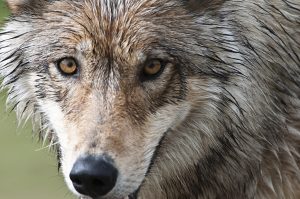
Alaska Republican congressman Don Young said he will “work every angle in congress” to repeal the new FWS rule, arguing that it is against the law. It is People in Office like Don Young that need to get Voted Out!! They have no Concern for wildlife at all!
East Fork wolf pack, found near Denali, was first researched in the 1930s and had shrunk significantly this year – and it’s now believed all may have perished.
The world’s longest-studied wolf pack may have been wiped out, wildlife officials fear amid an escalating battle between federal and state authorities in Alaska over the aggressive hunting of predators such as wolves and bears.
The East Fork wolf pack, found near Denali, North America’s tallest mountain, was first researched in the 1930s and provided the first detailed accounts of wolf behavior and ecology. But years of hunting, trapping and habitat disturbance reduced numbers to just one known female, a male and two pups earlier this year. It’s now believed all may have perished.
Bridget Borg, a biologist at the National Park Service, said that the body of the radio collared male wolf was seen at a hunting camp and there appears to be no sign of the female nor pups.
“We investigated a den site after,” Borg told Alaska Public Media. “There was clear evidence it was not being used as evidenced by vegetation that was growing around the entrance to the den site.”
Three of the four pack members fitted with tracking collars have now been killed by hunters in the past year. The possible demise of the entire pack, which was once a common sight for visitors entering Denali, also America’s largest national park, is likely to heighten criticism of Alaska’s intensive hunting of its largest predators.
On Friday, the US Fish and Wildlife Service ruled that hunters will not be allowed to conduct “predator control” in Alaska’s vast national refuges unless there are exceptional circumstances. National wildlife refuges span more than 73m acres of Alaska, including the 20m acre Arctic National Wildlife Refuge – the largest land-based protected area in the US.
The move prohibits controversial practices such as the killing of bear cubs or their mothers, bear baiting and the targeting of wolves and coyotes during the spring and summer denning season. The shooting of bears from a plane or helicopter will also be restricted. However, subsistence hunting by indigenous communities will still be allowed.
Alaska reinforced the trapping and shooting of predator animals after the Republican senator Frank Murkowski was elected as governor in 2002.
His successors, including Sarah Palin, have all supported a policy of “intensive management” that removes wolves and bears with the goal of boosting moose and caribou numbers for hunters. This stance has led to significant numbers of bears and wolves being killed if they wander away from national park land.
But the state has repeatedly clashed with the FWS, which has now decided to clamp down on hunting on federal land. Dan Ashe, director of the FWS,said “special interest groups” have worked to undermine the protection of species and landscapes.
Public lands are “not game farms managed for a slice of their diversity for the benefit of a few people who would call themselves hunters”, Ashe said. “Nor are they places where we can or should allow the practices authorized under Alaska’s ‘intensive predator management’ initiative.
“In the name of hunters and hunting, [Alaska has] approved shooting of brown and grizzly bears over bait; shooting mother bears with cubs, and even the cubs themselves; targeting bears and wolves from planes; and killing wolves and wolf pups in their dens. This is not sportsmanship.”
Conservationists and some scientists welcomed the decision, pointing out there is little evidence that culling bears and wolves actually leads to a big increase in prey species.
“Alaska’s economy depends on the lure of grizzly bears, wolves and other megafauna, and this rule will go a long way toward keeping the living capital in place, ”said Michael Haukedalen, Alaska state director for the Humane Society
But Alaska’s department of fish and game claimed the the new FWS regulations “override the state’s sovereign authority” to manage wildlife.
“This is continued erosion of the state’s authority to manage fish and wildlife for the benefit of Alaskans,” said Bruce Dale, director of Alaska’s division of wildlife conservation. “Moose, caribou, deer are important sources of natural food and food security for many Alaskans and cornerstones of the subsistence way of life.”
Alaska Republican congressman Don Young said he will “work every angle in congress” to repeal the new FWS rule, arguing that it is against the law.
“If this rule is allowed to stand, we could see an opening for future jurisdictional takings by the federal government, transforming a cooperative relationship between Alaska and the Fish and Wildlife Service to one of servitude,” Young said.
